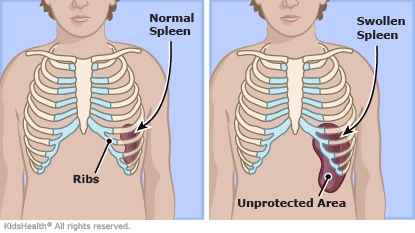Mononucleosis — commonly called mono — is an infection caused by a virus (a type of germ). Kids with mono usually have a sore throat, have swollen glands (lymph nodes) in the neck, feel tired, and have a fever. They may also have a rash. Some kids with mono get a swollen spleen, so it's important to protect the spleen from injury for a few weeks.
There is no treatment for mono, but the symptoms usually go away within a few weeks. In some kids, the tiredness can last longer.


Follow your health care provider's advice for:
General care:

Your child:

Your child:

How do kids get mono? Mono is caused by a virus called Epstein–Barr virus (EBV). It spreads through contact with saliva (spit). It is usually spread through coughing, sneezing, kissing, or sharing eating utensils, straws, or drinking glasses.
Can someone get mono more than once? Most people don't get mono from EBV more than once. But they can get a mono-like illness from other types of viruses.
Is my child contagious? Yes, kids with mono spread the virus and sometimes it's not easy to tell when they are no longer contagious. They can help lower the risk of infecting someone else by washing their hands well and often and not sharing eating utensils, straws, or drinking glasses.
Will an antibiotic help my child get better faster? Antibiotics treat bacteria, not viruses. Since mono is caused by a virus, an antibiotic won't help.